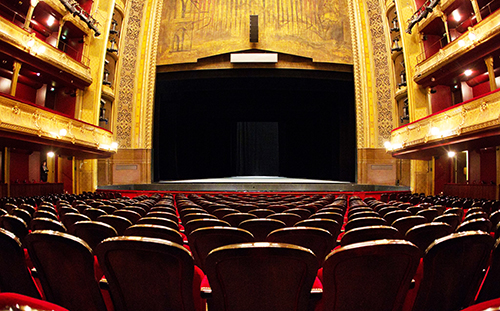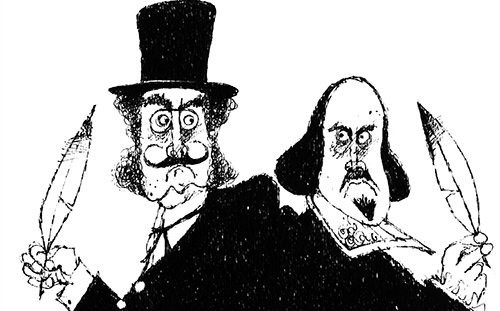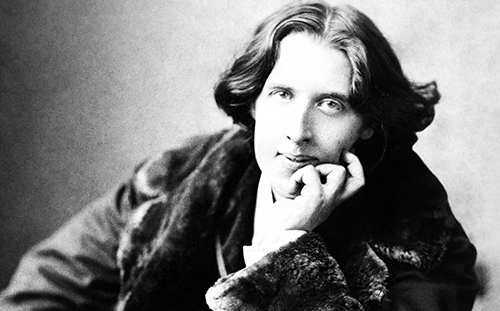
Tim Berners-Lee, creator of the internet, brought about a revolution that overwhelmed, consumed, and eventually defined contemporary society, facilitating freedom of speech in its rawest form.
A universally accessible resource of information, music, film and literature, the internet has reduced the value of the tangible book or CD for example, resulting in the inevitable and devastating decline of particular industries.
Theatre remains relatively safe, largely unperturbed by the culture of the ‘free download.’ A curated theatrical experience can be purchased in the form of a Phantom of the Opera concert DVD, but nothing available online yet threatens live, visceral, organic, fleshy theatre. However, traditional theatre criticism has fallen victim: In one respect, the immediate, wide-spread accessibility of a review has facilitated increased readership, but rapid turn-around and ‘free-for-all’ authorship means that the quality of criticism, at one time an art form in itself, is suffering. After all, “If everyone’s a critic, then no one’s a critic.” (L.Winer, Newsday)
The internet, by putting power into the hands of the people, has actively encouraged the spread of opinion.
Where once, books were ritually burnt because of the political threat posed by the persuasive written word, the internet, by putting power into the hands of the people, has actively encouraged the spread of opinion. Writer John Moore explains that, “When it comes to arts criticism, the internet was supposed to be the great equaliser,” but, what truth or meaning is there in anything online? The internet is everything and nothing because it has no centralised governance. What is fact without validation? Opportunistic bloggers, tweeters, and rapid-response reviewers, have filled the information vacuum created by the impartial internet, and whilst these unpaid, unqualified, unknowledgable writers slather the web with their opinions, informative, measured and witty criticism slips into the archives of yet another lost art form. Web reviewers, writing to varying degrees of purpose or proliferation have spawned a culture of speed rather than that of considered opinion, and this has resulted in wide-spread unemployment; John Moore, for example, was the last full-time, professional critic in Denver.
As experienced writers become surplus to requirement we need to ask, can theatre exist without criticism? The answer is dependent upon what you believe the purpose of criticism to be. What do you read and who do you trust? What do you hope to achieve by flicking to the arts pages of a paper? In any case, with the standard of criticism (online and in the papers) continuing to slip, the critic’s reputation worsens. What future is there?

Before we confront the future, let us look firstly to the past. The earliest known reference to criticism dates back to C.380 B.C.E and Plato’s Republic. Laying a foundation for critical discourse in the classical world, Plato explains how it was fitting for a rhapsode, (poet) to respond verbally to theatrical entertainments: “For the poet is a light and winged and holy thing, and there is no invention in him until he has been inspired and is out of his senses, and the mind is no longer in him.” In the beginning then, there were high expectations. In the 1800’s, critics played an increasingly important role within the American press, and despite being accused of reducing feelings to a state of miserable refinement, they were valued, employed and at least possessed such skills. Meanwhile, as Irving Wardle outlines in his book Theatre Criticism, the Grub Street slums of Georgian London rapidly became a bohemian hive of artistic activity and were the probable origin of theatrical criticism in Britain. By the 1850’s, advancements in printing and the press fuelled an explosion in journalism, and in 1935, cementing that progress, establishment of The Drama Critic’s circle ensured that the critic’s influence continued to abound.
Conversely, 2007 saw the beginning of wide- spread layoffs at newspapers and magazines leaving dozens of veteran arts journalists professionally homeless, expunged by internet reviewers or cheaper freelancers. And the situation continues to worsen, evidence now suggesting that criticism has reached such a point of decline that it is no longer significant; it no longer has a part to play.
What could today’s critic offer in order to reinstate their own necessity and worth? What do we want? Reviewing, simply put, is the act of writing or speaking about the performing arts, so no one person can dictate what it should or shouldn’t be, and if critics disagree amongst themselves, that is nothing compared to the public disagreement over what their role should be. We all require something different, but one might hope to locate at least one, two or a combination of the qualities listed below:
A review should be… Informative. The piece should contain basic, accurate information about the show/production in order to keep the reader in touch with the continuously evolving theatrical landscape – a landscape which, for some, sits at the epicentre of social functioning. The reviewer therefore, is required to attend, watch and inform.
Entertaining. Theatre is occasionally entertaining. Shouldn’t we be entertained when reading about it too? Be it witty or not, criticism should capture the style and essence of the show – reflecting, not just referencing it. It is good for the industry if people flick to the review pages; interesting articles will promote that intrigue.
Historical. Criticism is a way of documenting, remembering and celebrating past theatre, as well as present. Therefore a critic should have theatrical knowledge in order to root the production in question within theatrical history.
Constructive. Good, impartial criticism can provide the fresh eyes a creative team require. Reviewing is a fundamental and integral part of the development process – a way of improving theatre. “Only critical faculty enables any artistic creation at all.” (Wilde) What good does a sycophantic wash of praise do?
Reviews that meet our expectations are increasingly difficult to find, but they do exist
Opinionated: A review should assist the reader in making the all-important decision: to buy tickets or not to buy tickets? That’s a big responsibility, and if “everyone is a critic,” then who should we trust? Marketing might initially catch the attention of the consumer but a good review can cement the £60 per ticket spend. The public need an arbiter of taste.
And is this what we are getting? According to writer, John Russell Brown, criticism is an “unmapped quagmire,” – an art form that has remained, until recently, unexamined. But, in light of increased instability, it feels appropriate to turn the tables and examine what remains. Reviews that meet our expectations are increasingly difficult to find, but they do exist: Ben Brantley, for example, reviewed Menken and Fierstein’s Broadway musical, Newsies, for the New York Times. His piece, ‘Urchins with Punctuation,’ is lengthy and entertaining, reflecting the show’s energy and offering a measured and reasoned opinion from which the individual reader can decipher the production’s suitability. A literary achievement, he gives credit without verging into the bland territory of hyperbole: “Mr. Feldmen’s lyrics are spot on, while the melody reminds us just how charming a composer Mr.Menken […] can be.” Overblown praise only provokes cynicism, disappointment and a wilfulness to protest. He is refreshingly witty: “That doesn’t stop them from burning energy like toddlers on a sugar high at a birthday party,” and immediately captivates the reader, much in the same vein as a play might wish to do. Brantley also resists the trappings of writing a gratuitous plot synopsis, instead summarising the narrative in one
Plato line: “The show’s title characters, feisty lads of the urban jungle […] make their living pushing the papes.”

In terms of language, Brantley uses the “read all about it,” exclamatory, punctuated energy of the show to drive his piece and employs the colloquial so as to serve the readership and the show’s potential audience. In addition, the grounded review acknowledges current social trends: “These days urchins have mostly been replaced in popular entertainment by troubled teenage vampires (‘Twilight’) and fresh-fleshed human killing machines (‘The Hunger Games’).” Perhaps you could criticise Brantley for failing to address the historical concerns of said urchins, but the all singing all dancing, lavish musical does not lend itself to a serious discussion of these themes. If the show fails to address it, then why should the reviewer? Instead, Brantley reviews Newsies for what it is. Finally and perhaps most importantly, is Brantley’s impressive honesty. He bravely asserts his opinion in the confident 1st person, and in a way that is simultaneously constructive and comical: “I commend the cast members for always appearing to be excited by what they are doing. Unfortunately, that is not the same as being exciting.”
Of course, Brantley is not the only capable writer in print, but with the situation as it is, and talented writers (young and old) being forced to write to unrealistic deadlines, often for no pay, is it any wonder that standards and expectations are not being met? Infuriatingly, criticism also continuously undermines itself in the following ways: Firstly, reviews have become monetized.
The internet rarely offers informed, impartial, measured opinion.
It is increasingly common for large production companies to pay papers (inevitably tantalised by the fee) for headline quotes. We are now bombarded with emphatic posters making incredible claims: “It’s the greatest show on Earth!” for example. But, if companies pay for quotes, how are we, the reader, able to distinguish between a review and a sales pitch? The differentiation no longer exists. Secondly, writers for particular sites receive a rate of pay dependant on the number of ‘hits’ a review receives. Obviously, a 5* piece, fizzing with praise, is shared and circulated by the company and consequently, only the sycophant can afford to eat. This severely limits the opinion of the honest reviewer, terrified of displeasing. That’s not theatre, nor is it criticism. That’s bribery and actually, all the reader gets is more marketing.
It is no coincidence that as we see more of the above, (not to mention dry, ignorant, distasteful writing) people lose faith in criticism, no longer functioning in the traditional capacity on which they relied. Simply put, the remaining work is not good enough to sustain the form’s validity. Let us remember for a moment Oscar Wilde’s expectation: “It is criticism rather than emotional sympathies, abstract ethics or commercial advantages that would make us cosmopolitan and serve as the basis of peace.” (Wilde) Gone, I fear, are the days of this long lost ideology.

So what can be done? Due to the human need to impose form on chaos, art will always be accompanied by some sort of criticism; it cannot exist without it. However, in order to prevent being displaced entirely by the unmediated voice of the internet, critics need to act. Public reviews, such as those found on Amazon or Trip-Advisor, for example, tend to be either glowing or scathing. The internet rarely offers informed, impartial, measured opinion. For as long as this remains to be the case, the critic, as an arbiter of taste, stands a chance. Continuing to encourage a wealth of discussion and increasing public awareness will assist to stimulate change; only an amalgamation of minds can forge progress at this stage and suggestions are already being made.
Due to the human need to impose form on chaos, art will always be accompanied by some sort of criticism; it cannot exist without it.
No one can prescribe a format for ‘good’ criticism; pieces are as individual as plays or paintings, but perhaps, as was conceded at ‘The Art of Criticism’ conference in London, 2013, the future of criticism might hinge upon a willingness to adapt. For example, Brantley argues that reviews cannot be written well AND quickly. “I don’t think you should go with your very first instinct. I don’t think theatre is sports.” However, in order to adapt to 21st century demands, critics may no longer be allowed the luxury of “a chance to process what [they’ve] seen.” Mark Shenton, in his blog for The Stage, identifies how critics, such as Billington, Taylor and Letts, have been attending performances ahead of press night, in order to allow
for writing time. This is not an ideal solution – a preview should be a preview, but early viewing could potentially improve the standard of published work. Also in question is the star-rating system, which some papers have dismissed in order to encourage a thorough reading of the piece. It is too tempting to place great emphasis on the over-simplistic, reductionist, blurry distinction between 3 or 4 stars.
There are problems to be addressed and solutions to be trialled, but with persistence, adaptation and adjustment critics may well prevail. (Alternatively, we can hope that readers themselves might start to demand better!) However, if the horizon continues to darken, traditional theatre critics, artists as they are, may continue to suffer, reminiscent of where it all began – Grub Street and the impoverished, bohemian neighbourhood of hack writers. •
.
This article is featured in issue 10 of the printed version Fourthwall Magazine. Subscribe here.
.
Sources:
Oscar Wilde, The Artist as Critic, Random House, 2013
Matthew Arnold, Can art exist without commentary?
Mark Shenton, Blog for the Stage, The Future of Criticism is already Here, 2013
Ben Brantley, New York Times
Julie York Coppens, Theatre criticism: A highly selective timeline, www.dramacritics.org
en.Wikipedia.org
Irving Wardle, Theatre criticism, Faber and Faber
Dr Claire McManus, The Origins of Criticism: From Dryden to Manley, Cambridge University Press, 2003
Be the first to comment